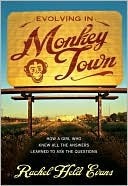More on this book
Community
Kindle Notes & Highlights
I’m an evolutionist because I believe that the best way to reclaim the gospel in times of change is not to cling more tightly to our convictions but to hold them with an open hand.
Evolution means letting go of our false fundamentals so that God can get into those shadowy places we’re not sure we want him to be. It means being okay with being wrong, okay with not having all the answers, okay with never being finished.
But Jesus rarely framed discipleship in terms of intellectual assent to a set of propositional statements.
Some Christians are more offended by the idea of everyone going to heaven than by the idea of everyone going to hell.
Dan always says that as soon as you think you’ve got God figured out, you can bet on the fact that you’re wrong.
“We do know that no person can be saved except through Christ,” he wrote in Mere Christianity. “We do not know that only those who know Him can be saved by Him.”11
We are not saved by information. We are saved by restored relationship with God, which might look a little different from person to person, culture to culture, time to time.
When we require that all people must say the same words or subscribe to the same creeds in order to experience God, we underestimate the scope and power of God’s activity in the world.
Isaiah 55 provides an entirely different framework for thinking about God’s justice, because it suggests that we have it backward—the mystery lies not in God’s unfathomable wrath but in his unfathomable mercy. God’s ways are higher than our ways because his capacity to love is infinitely greater than our own. Despite all that we do to alienate ourselves from God, all that we do to insult and disobey, God abundantly pardons again and again.
God’s ways are higher than our ways not because he is less compassionate than we are but because he is more compassionate than we can ever imagine.
The longer our lists of rules and regulations, the more likely it is that God himself will break one. The more committed we are to certain theological absolutes, the more likely we are to discount the work of the Spirit when it doesn’t conform to our presuppositions.
When we refer to “the biblical approach to economics” or “the biblical response to politics” or “biblical womanhood,” we’re using the Bible as a weapon disguised as an adjective.
Maybe God wants us to have these discussions because faith isn’t just about being right; it’s about being a part of a community.
Perhaps our love for the Bible should be measured not by how valiantly we fight to convince others of our interpretations but by how diligently we work to preserve a diversity of opinion.
My interpretation can be only as inerrant as I am, and that’s good to keep in mind.
They weren’t searching for historical evidence in support of the bodily resurrection of Jesus. They were searching for some signs of life among his followers.
As I struck up correspondence with several of my readers, I found that most of the time it wasn’t the weight of the questions themselves that burdened their faith but rather the notion that they shouldn’t be asking them, that it wasn’t allowed.
In fact, I am convinced that what drives most people away from Christianity is not the cost of discipleship but rather the cost of false fundamentals.
Taking on the yoke of Jesus is not about signing a doctrinal statement or making an intellectual commitment to a set of propositions.
But I’m telling it because it’s the best evidence I’ve got in support of my theory of evolution, that faith must adapt in order to survive.
I used to think that the measure of true faith is certainty. Doubt, ambiguity, nuance, uncertainty—these represented a lack of conviction, a dangerous weakness in the armor of the Christian soldier who should “always be ready with an answer.”
Doubt is a difficult animal to master because it requires that we learn the difference between doubting God and doubting what we believe about God. The former has the potential to destroy faith; the latter has the power to enrich and refine it. The former is a vice; the latter a virtue.
Faith in Jesus has been recast as a position in a debate, not a way of life.
Most of the people I’ve encountered are looking not for a religion to answer all their questions but for a community of faith in which they can feel safe asking them.
“Belief is always a risk, a gamble—an adventure, if you will. The line between faith and doubt is the point of action. You don’t need certainty to obey, just the willingness to risk being wrong.”
If there’s one thing I know for sure, it’s that serious doubt—the kind that leads to despair—begins not when we start asking God questions but when, out of fear, we stop.


